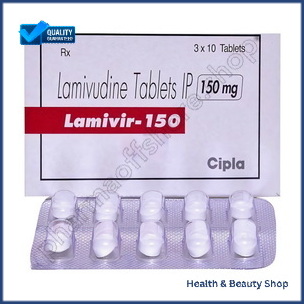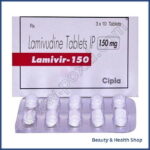ADDICTION
ALCOHOL DEPENDENCE
QUIT SMOKING
ALLERGY
ANTI FUNGAL
FUNGAL INFECTION
FUNGAL NAIL INFECTIONS
ANTI-REJECTION DRUGS
ANTI WORM
ANTIBIOTIC
BACTERIAL INFECTIONS
ARTHRITIS
GOUT
OSTEOARTHRITIS
RHEUMATOID ARTHRITIS
BLOOD
LOW PLATELET COUNT
THROMBOPHLEBITIS
VARICOSE VEINS
COLON
ANAL FISSURE
PILES
ULCERATIVE COLITIS
DIABETES CARE
DIABETES INSIPIDUS
DIABETES TYPE
DIABETIC FOOT ULCERS
GLUCOSE MONITOR
EYES/EAR CARE
DRY EYES
EYE CARE
EYE EXAMINATION
EYE INFECTION
EYE LASHES
EYE PAIN
GLAUCOMA
OCULAR HYPERTENSION
UVEITIS
FEVER CARE
MALARIA
RHEUMATIC FEVER
TYPHOID FEVER
GASTROINTESTINAL
ACIDITY
CONSTIPATION
CROHN'S DISEASE
DIARRHOEA
GALLBLADDER STONES
INTESTINAL ULCERS
IRRITABLE BOWEL SYNDROME
MOTION SICKNESS
NAUSEA
Lamivir 150 mg (Lamivudine)
| Active Ingredient (Generic Name): | Lamivudine |
|---|---|
| Indication: | HIV infection, Chronic hepatitis B virus (HBV) infection |
| Manufacturer: | 5 gm in 1 tube and 10 gm in 1 tube |
| Packaging: | 10 tablets in one strip |
| Strength: | 150 mg |
From: $31.00
Lamivir 150 mg is a nucleoside reverse transcriptase inhibitor used to treat HIV infection and hepatitis B virus. It works by inhibiting the reverse transcriptase enzyme, which blocks HIV replication and slows disease progression.
The medication is taken orally, with or without food, in a dosage determined by a doctor. Lamivir 150 mg reduces viral load, improves treatment outcomes, and enhances health outcomes.
When developing a treatment plan, it is essential to understand the benefits, potential interactions, and safe administration of Lamivir 150 mg to maximize therapy effectiveness.
Main Points
? Lamivir 150 mg is a nucleoside reverse transcriptase inhibitor that blocks HIV replication by inhibiting viral DNA synthesis.? It is used to treat HIV infection, hepatitis B virus, and other viral infections by slowing down viral replication.? The dosage is determined by a doctor based on medical history and condition severity, and it is recommended for HIV and chronic hepatitis B.? Precautions include considerations for pregnancy, lactation, and potential allergic reactions; it is essential to discuss benefits and risks with a healthcare provider.? Lamivir 150 mg should be stored away from direct sunlight and moisture at room temperature, and disposal should be done through a drug take-back program.
What Is Lamivir 150 mg?
Lamivir 150 mg is a nucleoside reverse transcriptase inhibitor (NRTI) that interrupts HIV’s ability to multiply, slowing disease progression. It is used in combination with other antiretroviral agents to treat HIV-1 infection in adults and children. This oral medication is available in tablet and oral solution forms.
As part of highly active antiretroviral therapy (HAART), Lamivir 150 mg reduces viral load, increasing the chances of effectively managing the infection. It is crucial to take this medication as directed by a healthcare provider, as inconsistent adherence can lead to reduced efficacy and potential drug resistance. Take Lamivir 150 mg with or without food, and avoid missing doses to ensure optimal results.
How Does Lamivudine Work?
Lamivudine is an antiretroviral medication that targets the HIV virus. It inhibits the viral reverse transcriptase enzyme, which is essential for the virus’s replication process. By blocking this enzyme, Lamivudine prevents the virus from multiplying, thereby slowing the progression of HIV.
Mechanism of Action
Lamivudine inhibits the activity of reverse transcriptase, an enzyme essential for HIV replication. Once ingested, Lamivudine is converted into its active form, lamivudine triphosphate, inside cells. This active form competes with nucleoside triphosphates necessary for viral DNA synthesis, reducing the amount available for viral replication and hindering the process.
Lamivudine also gets incorporated into viral DNA, causing termination of DNA synthesis. Lamivudine triphosphate acts as a chain terminator, preventing further extension of viral DNA. As a result, the virus cannot replicate, and its ability to infect new cells is reduced. By targeting reverse transcriptase and terminating DNA synthesis, Lamivudine blocks HIV replication, slowing disease progression.
Anti-HIV Properties
Lamivudine exhibits anti-HIV properties by inhibiting viral replication and disrupting the life cycle of HIV. The drug is converted into its active form, lamivudine triphosphate, which competes with natural nucleotides for incorporation into viral DNA, leading to premature termination of viral DNA synthesis and inhibition of HIV replication.
Lamivudine reduces the amount of viral RNA in the blood, making it harder for the virus to multiply. The drug’s presence in immune cells prevents HIV from inserting its genetic material into cells, blocking an important step in the viral life cycle. By targeting multiple stages of the HIV replication process, lamivudine significantly reduces the viral load, slowing disease progression and improving overall health.
Continuous use of lamivudine as prescribed leads to a notable decrease in the amount of HIV in the blood, allowing the immune system to recover and regain strength.
Uses of Lamivir 150 mg Tablets
Lamivir 150 mg tablets are used to treat HIV infection, hepatitis B virus (HBV), and other viral infections. This medication is a nucleoside reverse transcriptase inhibitor (NRTI) that helps slow down viral replication.
| Infection | Virus | Treatment Outcome |
|---|---|---|
| HIV | Human Immunodeficiency Virus | Slows disease progression |
| HBV | Hepatitis B Virus | Reduces viral load and liver damage |
| Other viral infections | Various viruses | Inhibits viral replication and reduces symptoms |
Lamivudine Dosage and Administration
The dosage of Lamivir 150 mg tablets is determined by a doctor based on medical history, weight, and the severity of the condition. For HIV-1 infection, the recommended dosage is 150 mg or 300 mg twice daily. For chronic hepatitis B, the recommended dosage is 100 mg once daily.
Take Lamivir 150 mg tablets orally with or without food, swallowing them whole with a full glass of water. Do not crush, chew, or split the tablets, as this can affect medication absorption. If a dose is missed, take it as soon as possible, but do not double the dose. Consistency is crucial to maintaining therapeutic levels in the blood. If uncertain about dosage or having questions, consult a doctor or pharmacist for guidance.
Benefits of Taking Lamivir 150 mg
Taking Lamivir 150 mg as prescribed can effectively treat HIV-1 infection and hepatitis B. Adhering to the treatment plan can lead to improved health outcomes and a better quality of life. Continued use of Lamivir 150 mg can reduce symptom severity and slow disease progression.
Effective Treatment Option
Taking Lamivir 150 mg as directed by a healthcare professional can improve treatment outcomes for patients with HIV-1 infections. This medication reduces viral load, slowing disease progression. Incorporating Lamivir 150 mg into a treatment regimen improves immune system function, reducing the risk of opportunistic infections. It also delays the emergence of resistance, allowing for more effective long-term management of HIV-1.
With continued use of Lamivir 150 mg, HIV-1 RNA levels decrease, indicating a more controlled infection. This reduces the risk of transmission to others. Lamivir 150 mg has a favorable safety profile, with most patients tolerating the medication well. Adhering to a treatment plan that includes Lamivir 150 mg can improve treatment outcomes and quality of life.
Improved Health Outcomes
Incorporating Lamivir 150 mg into treatment regimens can lead to significant health improvements, including enhanced immune function and reduced risk of opportunistic infections. This is due to Lamivir 150 mg’s ability to suppress HIV replication, allowing the immune system to recover and regain its ability to fight off infections.
As immune function strengthens, overall well-being improves, characterized by increased energy levels and reduced illness frequency. The risk of opportunistic infections, such as pneumonia, tuberculosis, and toxoplasmosis, decreases. These infections can be life-threatening for individuals with weakened immune systems.
Adhering to a Lamivir 150 mg regimen can improve quality of life, enabling individuals to engage in daily activities without the burden of chronic illness. By controlling HIV spread, individuals can live more normal, productive lives with reduced risk of transmitting the virus to others. Lamivir 150 mg helps individuals regain control over their health.
Possible Side Effects of Lamivudine
Possible Side Effects of Lamivudine
Lamivudine is generally well-tolerated, but some individuals may experience side effects.
Common side effects of Lamivudine include:
- Nausea and vomiting: Stomach discomfort may lead to nausea and vomiting.
- Headache: Mild to moderate headaches are a common side effect.
- Fatigue: The medication may cause tiredness or exhaustion.
- Diarrhea: Loose stools or diarrhea may occur as the body adjusts to the medication.
These side effects are usually mild and temporary. If you experience severe or persistent side effects, consult your healthcare provider.
Interactions With Other Medications
Interactions With Other Medications
When taking Lamivudine, it is crucial to consider potential interactions with other medications. Inform your doctor about all medications, supplements, and vitamins you are currently taking to avoid potential interactions.
Lamivudine may interact with medications eliminated by the kidneys, such as trimethoprim and sulfamethoxazole, increasing the risk of side effects. Combining Lamivudine with medications that can cause pancreatitis, such as didanosine, may increase the risk of pancreatitis. Exercise caution when taking Lamivudine with medications that can cause peripheral neuropathy, such as stavudine and didanosine, as this may increase the risk of nerve damage.
Work closely with your healthcare provider to manage these interactions and minimize the risk of adverse effects. Your doctor may need to adjust the dosage of Lamivudine or other medications to ensure safe and effective treatment. Openly discuss your medications with your healthcare provider to minimize the risk of interactions and achieve the best possible outcomes.
Precautions and Contraindications
When considering Lamivir 150 mg, it is essential to be aware of the precautions and contraindications associated with this medication. Pregnancy and lactation, allergic reactions, and potential drug interactions with other medications should be taken into account.
Pregnancy and Lactation
Pregnancy and Lactation
If you are pregnant or plan to become pregnant while taking Lamivir 150 mg, inform your doctor. The effects of Lamivir 150 mg on the fetus are not well understood. Although animal studies show no evidence of harm, human studies are limited, and potential risks cannot be ruled out.
Regarding lactation:Lamivudine is excreted in breast milk, but the amount is unknown. The effects of Lamivir 150 mg on the nursing infant are unknown. Mothers taking Lamivir 150 mg should not breastfeed. If Lamivir 150 mg is taken while breastfeeding, weigh the benefits of breastfeeding against the potential risks to the infant.
Discuss your pregnancy or lactation status with your doctor to determine the best course of treatment. Your doctor will help you make an informed decision about taking Lamivir 150 mg during pregnancy or lactation.
Allergic Reactions
Lamivir 150 mg can cause severe allergic reactions. Discuss your medical history with your doctor before starting treatment. If you’ve had allergic reactions to lamivudine or its components, you’re at risk of experiencing another severe reaction. Inform your doctor about any allergies, including food, drug, or environmental allergies.
Symptoms of an allergic reaction to Lamivir 150 mg include hives, difficulty breathing, swelling of the face, lips, tongue, or throat. In severe cases, an allergic reaction can lead to anaphylaxis, a life-threatening condition requiring immediate medical attention.
Monitor your body’s response to Lamivir 150 mg, especially during the initial stages of treatment. If you experience unusual symptoms, such as a rash, itching, or difficulty swallowing, seek immediate medical attention. Your doctor may adjust your dosage or recommend an alternative treatment option to minimize the risk of an allergic reaction.
Drug Interactions
When taking Lamivir 150 mg, it is crucial to disclose all medications, including prescription and over-the-counter drugs, to your doctor. Certain medications can interact with Lamivir 150 mg, increasing the risk of adverse effects or reducing its efficacy.
Lamivir 150 mg interactions with other medications can affect treatment outcomes. Some medications can alter Lamivir 150 mg’s efficacy or increase side effects. Conversely, Lamivir 150 mg may impact the efficacy of other medications.
Specific medications that may interact with Lamivir 150 mg include:
- Antacids, which may reduce Lamivir 150 mg absorption
- Ribavirin, which may increase the risk of anemia
- Interferons, which may increase the risk of lactic acidosis
- Nucleoside analogues, which may increase the risk of pancreatitis
Disclose all medications, supplements, and vitamins to your doctor to ensure safe and effective treatment with Lamivir 150 mg.
Lamivir 150 mg and Pregnancy
Pregnant women with HIV should consider the risks and benefits of taking Lamivir 150 mg. The FDA categorizes it as Category C, indicating animal reproduction studies show adverse fetal effects. Discuss potential risks with your healthcare provider, as the benefits may outweigh the risks, particularly with high viral loads or low CD4 cell counts.
Lamivir 150 mg passes into breast milk; weigh the benefits and risks of breastfeeding while taking this medication. Inform your healthcare provider if you’re pregnant or plan to become pregnant, as they may adjust your treatment regimen. They will closely monitor your pregnancy to minimize potential risks, as Lamivir 150 mg may affect fetal growth and development.
Storage and Disposal Instructions
Storage and Disposal Instructions
Store Lamivir 150 mg tablets in their original packaging, away from direct sunlight, moisture, and children, at a room temperature between 15?C to 30?C (59?F to 86?F). This maintains the medication’s potency and prevents degradation.
Dispose of Lamivir 150 mg tablets through a drug take-back program or by following pharmacist or healthcare provider instructions. Avoid flushing medication down the toilet or pouring it down the drain, as it can contaminate the environment. Keep the medication in its original container, tightly sealed to prevent accidental ingestion by children or pets. If unsure about disposal, consult a pharmacist or healthcare provider.
Common Lamivudine Drug Interactions
When taking Lamivir 150 mg, it is essential to be aware of potential drug interactions that may affect its efficacy or increase the risk of adverse effects. Lamivudine interactions with other antiretrovirals and medications can impact treatment safety and effectiveness. Understanding these interactions is crucial for safe and effective treatment.
Interactions With Antiretrovirals
Lamivudine interacts with multiple antiretroviral medications, including protease inhibitors, non-nucleoside reverse transcriptase inhibitors, and nucleoside reverse transcriptase inhibitors. These interactions may alter its efficacy or increase the risk of adverse effects.
Combining lamivudine with certain antiretrovirals can impact its efficacy or side effects. The following interactions have been observed:
- Ritonavir and lopinavir (protease inhibitors) may increase lamivudine’s concentration, potentially leading to toxicity.
- Nevirapine (non-nucleoside reverse transcriptase inhibitor) may reduce lamivudine’s concentration, decreasing its efficacy.
- Stavudine (nucleoside reverse transcriptase inhibitor) may increase the risk of pancreatitis when combined with lamivudine.
- Combining lamivudine with other nucleoside reverse transcriptase inhibitors, such as zidovudine or didanosine, may increase the risk of adverse effects.
It is essential to carefully evaluate these interactions and adjust treatment regimens accordingly to ensure optimal outcomes. Consult with a healthcare provider to determine the best approach for individual situations.
Interactions With Other Medicines
Interactions With Other Medicines
Lamivudine can interact with several medications, including trimethoprim and sulfamethoxazole, which may alter its efficacy or increase the risk of adverse effects.
Taking lamivudine with sorbitol increases the risk of pancreatitis. Additionally, lamivudine may interact with medications that inhibit or induce cytochrome P450 3A4, affecting its metabolism.
Exercise caution when taking lamivudine with medications that can cause pancreatitis, such as didanosine or stavudine. Lamivudine may also interact with certain antibiotics, such as rifampicin or rifabutin, affecting its absorption.
Inform your doctor about all medications you’re taking, including prescription and over-the-counter drugs, to minimize the risk of interactions. Your doctor may need to adjust your dosage or monitor you closely for potential interactions. Awareness of these interactions ensures safe and effective treatment with lamivudine.
Effects of Missing a Dose
If you miss a dose of Lamivir 150 mg, take it as soon as you remember, unless it’s almost time for your next scheduled dose.
Missing a dose can have consequences. Stay vigilant and take your medication as directed. Consult your healthcare provider or pharmacist if you’re unsure about what to do when you miss a dose.
When missing a dose:
- Don’t take a double dose to make up for the missed dose.
- Don’t stop taking Lamivir 150 mg without consulting your healthcare provider.
- Continue taking your medication as scheduled, even if you miss a dose.
- Inform your healthcare provider if you miss multiple doses or have trouble adhering to your treatment plan.
Overdose Symptoms and Treatment
Accidental Overdose of Lamivir 150 mg: Symptoms and Treatment
Taking more Lamivir 150 mg than prescribed can lead to an overdose. Recognizing the symptoms and responding appropriately is crucial. Overdose symptoms may include nausea, vomiting, diarrhea, headache, fatigue, and dizziness. In severe cases, seizures, coma, or even death can occur.
If an overdose is suspected, immediate medical attention is necessary. Call a doctor or emergency services, or visit the nearest hospital. Provide as much information as possible, including the amount of Lamivir 150 mg taken and the time it was taken. Do not attempt to induce vomiting or take any medication unless instructed to do so by a medical professional.
Treatment for overdose typically involves supportive care, such as administering fluids and monitoring vital signs. In severe cases, activated charcoal or other medications may be given to help absorb the excess drug. A healthcare provider will determine the best course of treatment based on the individual situation. Prompt medical attention is essential to preventing serious complications.
Buying Lamivir 150 mg Online Safely
When purchasing Lamivir 150 mg online, it is crucial to exercise caution to avoid counterfeit products and ensure a reliable source.
To ensure a safe purchase, consider the following:
- Verify the online pharmacy’s credibility by checking for licenses and certifications from recognized accrediting bodies, such as the National Association of Boards of Pharmacy (NABP).
- Ensure the online pharmacy requires a valid prescription from a licensed healthcare provider before dispensing Lamivir 150 mg.
- Be wary of unusually low prices, as they may indicate a counterfeit product. Compare prices from different sources to determine the market rate.
- Ensure the online pharmacy uses a secure payment gateway and provides tracking information for your shipment.
Frequently Asked Questions
Before taking Lamivir 150 mg with other antiretroviral medications, consult your doctor. Combining medications increases the risk of side effects and interactions. Your doctor will help manage them effectively.
Will Lamivir 150 mg Cure My HIV Infection Completely?
Currently, there is no cure for HIV infection. However, antiretroviral therapy can effectively manage the virus, suppressing it to undetectable levels. With proper treatment and adherence, people living with HIV can expect a long, healthy life.
Can I Drink Alcohol While Taking Lamivir 150 mg Tablets?
Consuming alcohol while taking Lamivir 150 mg tablets is not recommended. Alcohol can increase the risk of liver damage and potentially reduce the medication’s effectiveness.
How Long Does It Take to See the Effects of Lamivir 150 mg?
The effects of Lamivir 150 mg typically become apparent within 2-4 weeks, as viral load decreases and liver enzymes stabilize. Optimal results are usually achieved within 3-6 months.
Is Lamivir 150 mg Safe to Use in Pediatric Patients?
Safety and efficacy of Lamivir 150 mg have not been established in pediatric patients under 3 months old. For those between 3 months to 12 years, dosage adjustments may be necessary.
Conclusion
Lamivir 150 mg is a medication prescribed for managing HIV and hepatitis B. Take it exactly as directed by your doctor. If you have questions or concerns, consult your doctor. Proper use of Lamivir 150 mg can improve health outcomes. Before purchasing Lamivir 150 mg online, consult a healthcare professional. Do not stop taking the medication without their guidance.








